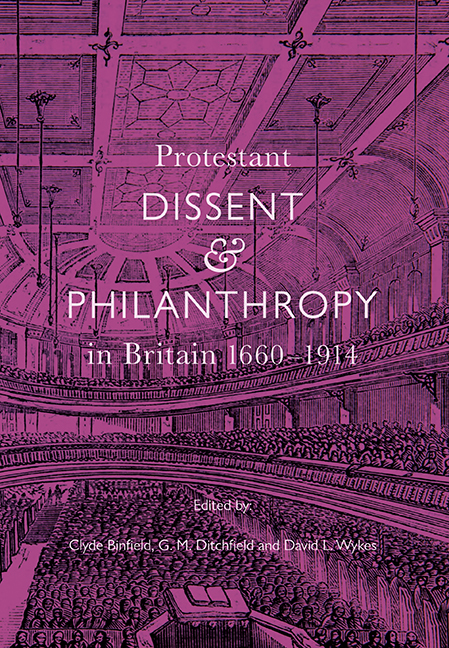Book contents
- Frontmatter
- Dedidcation
- Contents
- List of Illustrations and Tables
- List of Contributors
- Acknowledgements
- List of Abbreviations
- Introduction
- 1 Dissent and Charity, 1660–1720
- 2 Dissenters and Charity Sermons, c. 1700 to 1750
- 3 John Howard, Dissent and the Early Years of Philanthropy in Britain
- 4 Rational Philanthropy: Theory and Practice in the Emergence of British Unitarianism, c. 1750–1820
- 5 David Nasmith (1799–1839), Philanthropy Expressed as Campaigning
- 6 Building Philanthropy: The Example of Joshua Wilson (1795–1874)
- 7 Funding Faith: Early Victorian Wesleyan Philanthropy
- 8 Unitarians and Philanthropy After 1844: the Formation of a Denominational Identity
- 9 Children and Orphans: Some Nonconformist Responses to the Vulnerable in Victorian Britain
- 10 The Rowntree Family and the Evolution of Quaker Philanthropy, c. 1880 to c. 1920
- 11 ‘Not slothful in business’: Enriqueta Rylands and the John Rylands Library
- Select Bibliography
- Index
- STUDIES IN MODERN BRITISH RELIGIOUS HISTORY
11 - ‘Not slothful in business’: Enriqueta Rylands and the John Rylands Library
Published online by Cambridge University Press: 21 March 2020
- Frontmatter
- Dedidcation
- Contents
- List of Illustrations and Tables
- List of Contributors
- Acknowledgements
- List of Abbreviations
- Introduction
- 1 Dissent and Charity, 1660–1720
- 2 Dissenters and Charity Sermons, c. 1700 to 1750
- 3 John Howard, Dissent and the Early Years of Philanthropy in Britain
- 4 Rational Philanthropy: Theory and Practice in the Emergence of British Unitarianism, c. 1750–1820
- 5 David Nasmith (1799–1839), Philanthropy Expressed as Campaigning
- 6 Building Philanthropy: The Example of Joshua Wilson (1795–1874)
- 7 Funding Faith: Early Victorian Wesleyan Philanthropy
- 8 Unitarians and Philanthropy After 1844: the Formation of a Denominational Identity
- 9 Children and Orphans: Some Nonconformist Responses to the Vulnerable in Victorian Britain
- 10 The Rowntree Family and the Evolution of Quaker Philanthropy, c. 1880 to c. 1920
- 11 ‘Not slothful in business’: Enriqueta Rylands and the John Rylands Library
- Select Bibliography
- Index
- STUDIES IN MODERN BRITISH RELIGIOUS HISTORY
Summary
The women in the Bible provided moral exemplars for Victorian women, from both conservative and radical perspectives. Their stories helped legitimise new roles for women, including as public philanthropists. Mary and Martha mark a particular site of contention, exemplifying feminine ideals split along religious lines: while evangelicals defended Martha's domestic work, High Church liberals praised Mary's celibate and contemplative life. The image/text illustrated below provides a different perspective. Here, Mary and Martha provide a visual gloss for the passage from Romans: ‘Not slothful in business; fervent in spirit; serving the Lord’. This passage, closely associated with Victorian masculine ideals, was ‘a favourite motto of Christian merchants’, as the Congregational minister Joseph Parker remarked wryly. The image/text is part of a collection illustrating the ‘Collects, Epistles and Gospels’ of the Book of Common Prayer, compiled by Enriqueta Rylands (1843–1908), founder of the John Rylands Library and the subject of this chapter. Rylands's caption, recognising Mary and Martha as exemplars of Christian service rather than of specifically female service, suggests a way in which religious narratives can provide a framework for interpreting Victorian women's philanthropy. By considering Rylands as a Dissenting philanthropist, whose benefactions drew on her religious belief and extensive wealth, we can see that her philanthropy was exceptional in scale, but not in form or purpose. Rylands comes into vision not only as an exceptional woman, but also as a significant figure in the history of Nonconformist philanthropy.
The John Rylands Library, opened to the public in 1900, exemplifies cultural distinction in histories of Nonconformity. Elsewhere, the Library takes on a primarily secular significance, as a foundation for education and learning. Enriqueta Rylands's reputation as a philanthropist rests on this legacy; but the Library was not an isolated act of philanthropy nor was it typical of her wider giving. Rylands's broader lifetime philanthropy is revealed in a small account book recording her charitable expenditure between 1904 and her death in 1908 (a previously unstudied source). This chapter will explore these accounts to reveal the ways in which Rylands gave her money, time and attention to philanthropic causes, and how Christian Stewardship shaped her giving. Secondly, the chapter will look at the impact of religion on her philanthropic objectives, both spiritual and secular.
- Type
- Chapter
- Information
- Protestant Dissent and Philanthropy in Britain, 1660–1914 , pp. 205 - 222Publisher: Boydell & BrewerPrint publication year: 2020



